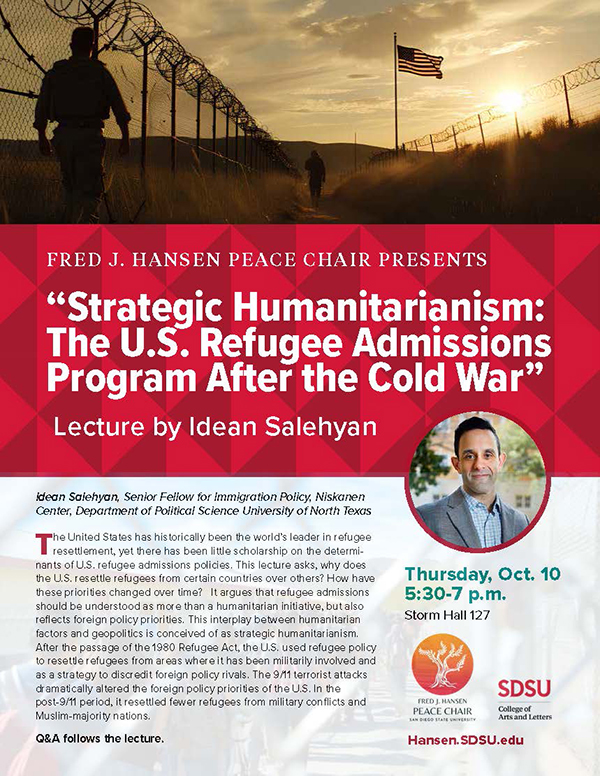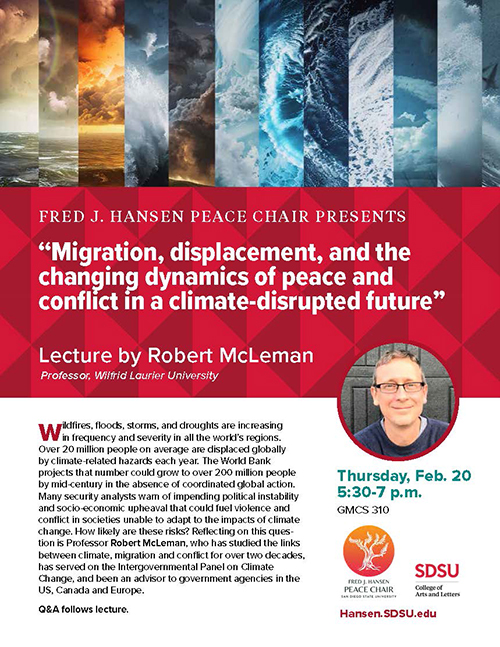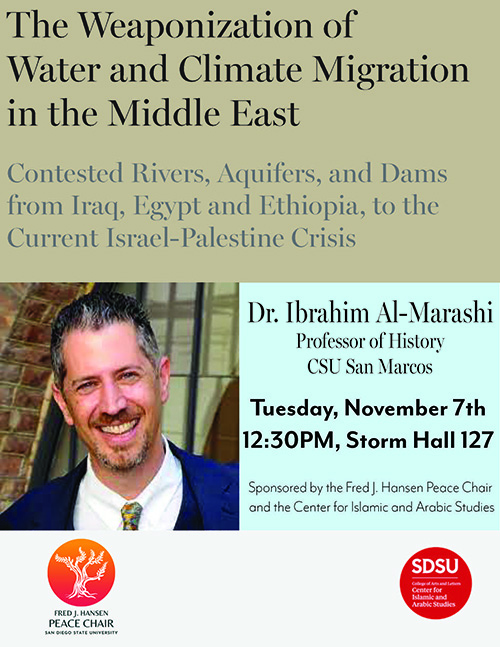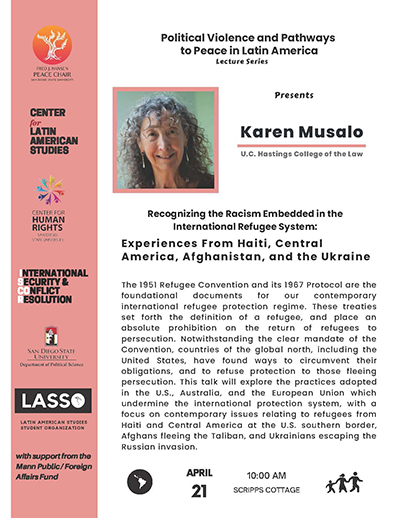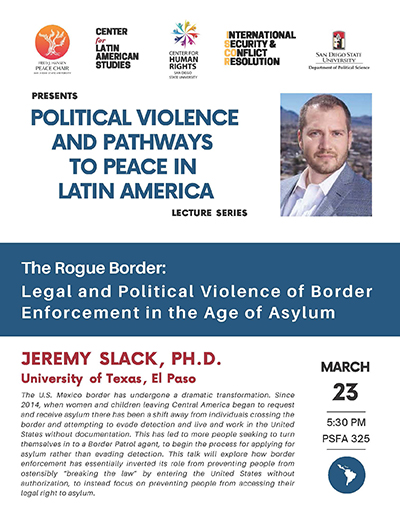Events
None at this time. Please check back.
Strategic Humanitarianism: The U.S. Refugee Admissions Program After the Cold War
Lecture by Idean Salehyan, Senior Fellow for Immigration Policy, Niskanen Center, Department of Political Science University of North Texas
Thursday, Oct 10, 2024
The United States has historically been the world’s leader in refugee resettlement, yet there has been little scholarship on the determinants of U.S. refugee admissions policies. This lecture asks, why does the U.S. resettle refugees from certain countries over others? How have these priorities changed over time? It argues that refugee admissions should be understood as more than a humanitarian initiative, but also reflects foreign policy priorities. This interplay between humanitarian factors and geopolitics is conceived of as strategic humanitarianism. After the passage of the 1980 Refugee Act, the U.S. used refugee policy to resettle refugees from areas where it has been militarily involved and as a strategy to discredit foreign policy rivals. The 9/11 terrorist attacks dramatically altered the foreign policy priorities of the U.S. In the post-9/11 period, it resettled fewer refugees from military conflicts and Muslim-majority nations.
Q&A follows the lecture.
Migration, displacement, and the changing dynamics of peace and conflict in a climate-disrupted future
Lecture by Robert McLeman, Professor, Wilfrid Laurier University
Thursday, February 20, 2025
5:30-7 p.m.
in GMCS 310
Wildfires, floods, storms, and droughts are increasing in frequency and severity in all the world’s regions. Over 20 million people on average are displaced globally by climate-related hazards each year. The World Bank projects that number could grow to over 200 million people by mid-century in the absence of coordinated global action. Many security analysts warn of impending political instability and socio-economic upheaval that could fuel violence and conflict in societies unable to adapt to the impacts of climate change. How likely are these risks? Reflecting on this question is Professor Robert McLeman, who has studied the links between climate, migration and conflict for over two decades, has served on the Intergovernmental Panel on Climate Change, and been an advisor to government agencies in the US, Canada and Europe.
Q&A follows lecture.
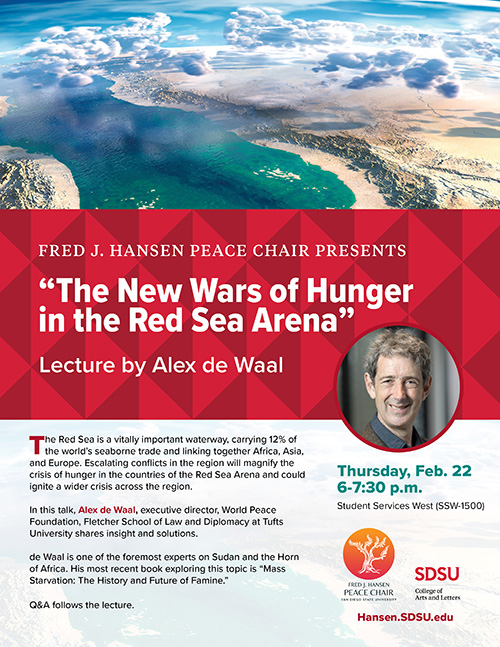 The New Wars of Hunger in the Red Sea Arena
The New Wars of Hunger in the Red Sea Arena
Lecture by Alex de Waal
Thursday, Feb. 22, 2024
6-7:30 p.m.
Location: Student Services West (SSW) 1500
The Red Sea is a vitally important waterway, carrying 12% of the world’s seaborne trade and linking together Africa, Asia, and Europe. Escalating conflicts in the region will magnify the crisis of hunger in the countries of the Red Sea Arena and could ignite a wider crisis across the region.
In this talk, Alex de Waal, executive director, World Peace Foundation, Fletcher School of Law and Diplomacy at Tufts University shares insight and solutions.
de Waal is one of the foremost experts on Sudan and the Horn of Africa. His most recent book exploring this topic is “Mass Starvation: The History and Future of Famine.”
Q&A follows the lecture
Why Iraq Still Matters
Thursday, November 9, 2023
12:30 - 1:45 p.m.
SDSU Conrad Prebys Aztec Student Union
It has been twenty years since the American invasion and occupation of Iraq. To mark this year’s Veterans Day, join us for a conversation with nationally-regarded scholars, and a veteran on the enduring and global consequences of that war and why it still matters today.
Featuring:
Zainab Saleh
Associate Professor of Anthropology, Haverford College
Steven Simon
Professor of Practice in Middle East Studies, University of Washington
Frank Sobchak
Chair of Irregular Warfare Studies, Modern Warfare Institute, West Point
Sponsored by J. Fred and Susan Oliver
The Weaponization of Water and Climate Migration in the Middle East: Contested Rivers, Aquifers, and Dams from Iraq, Egypt and Ethiopia, to the Current Israel-Palestine Crisis
Tuesday, November 7, at 12.30pm
SDSU Campus, Storm Hall 127
A Talk by Dr. Ibrahim Al-Marashi
Professor of History, CSU San Marcos
Co-sponsored with the Center for Islamic and Arabic Studies.
Building Peace Across Borders from Colombia to San Diego
Peacebuilding Event & Fair
Wednesday, Sept. 28 | 9 a.m. - 3 p.m.
The event panels bring together Colombian scholars and activists on the frontlines of peacebuilding to share about their experiences, and CAL experts to extend our analysis to thinking about what peaceful life might look like in the United States and other parts of the world. Both panels will take place in person and on-line via Zoom.
There will also be a Peace Fair featuring local peace and justice organizations from the San Diego Region offering possibilities for students, staff, and faculty to engage with local efforts in working towards a more peaceful community. There will also be Peace Cookies and Peace Popcorn!!
Political Violence and Pathways to Peace in Latin America Lecture Series
This series of 3 public lectures features experts on political violence and strategies for the guarantee of human rights and peacebuilding in Latin America and in the U.S.-Mexico Borderlands. The talks all give accounts of the implications of political violence, the connections between the long- term effects of war to the migrant crises of today, and ways in which local communities organize and respond to efforts for justice and peace.
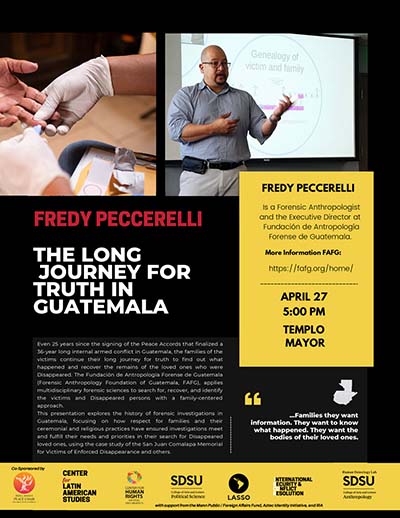 The Long Journey for Truth in Guatemala
The Long Journey for Truth in Guatemala
Featuring Freddy Peccerelli
Forensic Anthropologist and the Executive Director at Fundación de Antropología Forense de Guatemala
April 27 | 5 PM | Templo Mayor
Even 25 years since the signing of the Peace Accords that finalized a 36-year long internal armed conflict in Guatemala, the families of the victims continue their long journey for truth to find out what happened and recover the remains of the loved ones who were Disappeared. The Fundación de Antropología Forense de Guatemala (Forensic Anthropology Foundation of Guatemala, FAFG), applies multidisciplinary forensic sciences to search for, recover, and identify the victims and Disappeared persons with a family-centered approach.
This presentation explores the history of forensic investigations in Guatemala, focusing
on how respect for families and their ceremonial and religious practices have ensured
investigations meet and fulfill their needs and priorities in their search for Disappeared
loved ones, using the case study of the San Juan Comalapa Memorial for Victims of
Enforced Disappearance and others.
Recognizing the Racism Embedded in the International Refugee System: Experiences From Haiti, Central America, Afghanistan, and the Ukraine
Featuring Karen Musalo, Ph.D.
U.C. Hastings College of the Law
April 21 | 10 AM | Scripps Cottage
The 1951 Refugee Convention and its 1967 Protocol are the foundational documents for
our contemporary international refugee protection regime. These treaties set forth
the definition of a refugee, and place an absolute prohibition on the return of refugees
to persecution. Not withstanding the clear mandate of the Convention, countries of
the global north, including the United States, have found ways to circumvent their
obligations, and to refuse protection to those fleeing persecution. This talk will
explore the practices adopted in the U.S., Australia, and the European Union which
undermine the international protection system, with a focus on contemporary issues
relating to refugees from Haiti and Central America at the U.S. southern border, Afghans
fleeing the Taliban, and Ukrainians escaping the Russian invasion.
Race and the Borderlands Conference
April 7-8, 2023
The U.S.-Mexico border is a site of human suffering and a showcase of human resilience. This conference brings together scholars, practitioners, student organizations, and grassroots movements from the San Diego and Tijuana regions to collectively consider issues of human rights and racialization in our borderlands. The conference will focus on the human tolls and triumphs that flow across this border every day. We will consider the hindrances and costs, the lives and human sacrifice, and the stories of hope and justice that intermingle in the liminal space of the borderlands.
The Tijuana-San Diego border is not only the busiest border in the world, but also one that is teeming with life and productive capacity. We want to recognize and celebrate that also. This binational conference will focus on scholarly collaboration, community building, and movement of ideas and people in the region. “Race and the Borderlands” will also provide opportunities to hold space, and integrate frameworks for collective activism and set the agenda for new collaborations.
Learn more about the conference.
The Rogue Border: Legal and Political Violence of Border Enforcement in the Age of Asylum
Featuring Jeremy Slack, Ph.D.
University of Texas, El Paso
March 23 | 5:30 PM | PSFA 325
The U.S. Mexico border has undergone a dramatic transformation. Since 2014, when women
and children leaving Central America began to request and receive asylum there has
been a shift away from individuals crossing the border and attempting to evade detection
and live and work in the United States without documentation. This has led to more
people seeking to turn themselves in to a Border Patrol agent, to begin the process
for applying for asylum rather than evading detection. This talk will explore how
border enforcement has essentially inverted its role from preventing people from ostensibly
“breaking the law” by entering the United States without authorization, to instead
focus on preventing people from accessing their legal right to asylum.
Sponsored by the Hansen Peace Chair, the Center for Human Rights, International Security and Conflict Resolution, the Department of Political Science, and LASSO.
Religion, Resistance, and Re-existence in Latin America: Legacies of Liberation Theology and Social Movements for Rethinking Peace
Featuring Israel Arturo Orrego-Ecehverria
Tuesday, October 26, 2021
4PM
This talk was originally planned to take place on October 12, marking 527 years to the day that Christopher Columbus set foot on dry land of the Western Hemisphere, in 1492. Through the prism of "Liberation Philosophy" and the legacies of liberation theology, Colombian philosopher Arturo Orrego explores ideas of Latin America, its configuration within frames of colonialism, and the possibilities that philosophies of liberation for dismantling colonialism and building peace. The lecture will also consider Latin American "identities" and the relation with diasporic communities in the United States, and the fraught relationship between United States imperialism and the intimacies of connection between the U.S. and Latin America.
Israel Arturo Orrego-Ecehverria is professor of philosophy, theology, and education at the National University of Colombia-Distance and the Free University of Colombia. He is co-leader of the research group Tlamatinime and the Center for Education for Development. Orrego is on the board of directors for the South American Association of Philosophy and Theology. He is the author and co-author of various books and articles, mostly focused on Education for Development from a Latin American perspective, political ontologies, and philosophy of liberation.
Part of the Religion and Revolution in Latin America Lecture Series, Supported by the class RELS 406: God, Gold, and Glory
Cosponsored with the Center for Latin American Studies and the Department for the
Study of Religion
Religion, Politics, and Human Rights: Challenges for Building Peace in Colombia
Featuring Viviana Carolina Machuca Martinez
Wednesday, October 27, 2021
4 PM
In 2016, the Colombian government arrived to a peace agreement with the largest and oldest insurgency army in the Western Hemisphere, the Revolutionary Armed Forces of Colombia. After 60 years of war, Colombian society is forging toward a new horizon of peace with justice for all, with reparations for victims, and a renewed commitment to human rights and the empowerment of civil society. This talk will focus on the front-lines of coalition-based peacebuilding, with a focus on the importance of inter-religious, human rights-based advocacy and strategic political engagement.
Viviana is the Director of Inter-institutional Relations and Advocacy at World Vision Colombia, and is a civil society representative and advocate in areas of Youth and Child Empowerment and Protection with the National Family Welfare System. She has degree in Theological Sciences and holds an MA in Latin American Philosophy, with emphasis in Human Rights, Peace-building, and Gender Studies.
Part of the Hansen Lecture Series: "Peace on Frontlines"
Cosponsored with the Center for Latin American Studies and the Department for the
Study of Religion
Peace Week San Diego 2021
September 18-26, 2021
A week-long+ series of events to promote peaceful co-existence in San Diego*
Kale Festival
Sept. 18
10:00 AM- 2:00 PM with Mindfulness Community Yoga, workshops and discussions celebrating
Mutual Support
2:00 - 4:00 PM Treat M.I. Don't Mistreat M.I.
International Day of Peace
Sept. 21
12 PM - 1:30 PM Community Dialogue: Reimagining Public Safety 4 All of Us. On zoom.
6:30 - 8:00PM Breath of Life - A Restorative Circle
Fall Equinox
Sept. 21
4 PM WILPF Welcomes Peace San Diego! A meet & greet with the Women's International
League for Peace and Freedom. In person, with social distancing & masks.
6:30 PM Shining Peace with the Light Brigade
Kingian Nonviolence Workshop
Sept. 23
6:30 - 8:00 PM
Taize for Peace and Reconciliation Vigil
Sept, 24
6:30 - 8:00 PM with the Franciscan Peace Connection, at the Church of the Brethren
*in collaboration with Campaign Nonviolence Week of Actions 2021 and the UN International Peace Day.
Hosted by the Peace Resource Center of San Diego
